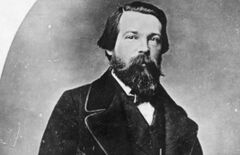Friedrich Engels
(author, socialist) | |
|---|---|
 | |
| Born | 28 November 1820 Barmen, Prussia |
| Died | 1895-08-05 (Age 74) London, England |
| Nationality | German |
| Alma mater | University of Berlin |
Friedrich Engels, anglicised as Frederick Engels, was a 19th century author and socialist whose writings continue to inform the struggles and inspire the hopes that define our own crisis-ridden age.
Tribute
Few political and intellectual partnerships can rival that of Karl Marx and Friedrich Engels. They not only famously coauthored the "Communist Manifesto" in 1848, both taking part in the social revolutions of that year, but also two earlier works – "The Holy Family" in 1845 and "The German Ideology" in 1846.
In the late 1870s, when the two scientific socialists were finally able to live in close proximity and to confer with each other every day, they would often pace up and down in Marx’s study, each on their own side of the room, boring grooves in the floor as they turned on their heels, while discussing their various ideas, plans, and projects.
They frequently read to each other passages from their works in progress. Engels read the entire manuscript of his "Anti-Dühring" (to which Marx contributed a chapter) to Marx before its publication. Marx wrote an introduction to Engels’s "Socialism: Utopian and Scientific". After Marx’s death in 1883, Engels prepared volumes two and three of "Capital" for publication from the drafts his friend had left behind. If Engels, as he was the first to admit, stood in Marx’s shadow, he was nevertheless an intellectual and political giant in his own right.[1]